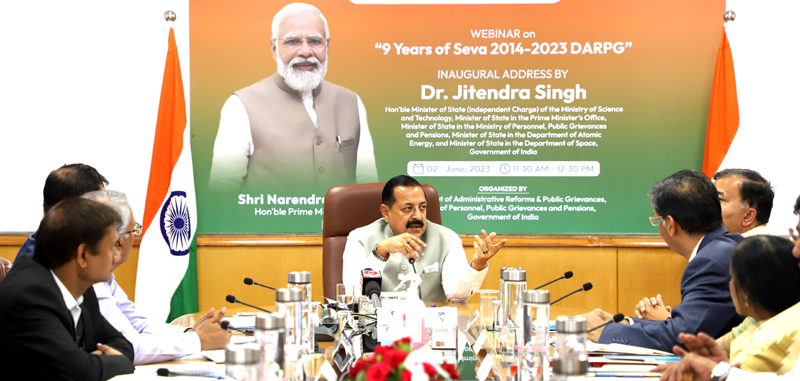
Excelsior Correspondent
NEW DELHI, June 2 : Union Minister of State (Independent Charge) Ministry of Science & Technology, PMO, Ministry of Personnel, Public Grievances & Pensions, Atomic Energy and Space, Dr. Jitendra Singh today said, nine years of administrative reforms under Prime Minister Narendra Modi are, in the long run, aimed at socio-economic transformation.
Delivering the inaugural address at a webinar on Administrative Reforms (2014-2023) in New Delhi, Dr. Jitendra Singh said, large scale use of technology and integration approach are the twin pillars of the revolutionary Governance Reforms carried out in the last nine years. On the occasion, he also released two booklets and one flyer and its e-Version on 9 Years of Administrative Reforms (2014-2023) to mark the completion of 9 years of Government led by Prime Minister Narendra Modi.
Dwelling on Administrative Reforms, Dr. Jitendra Singh said, ever since Narendra Modi came to power in 2014, the Prime Minister gave us the mantra ‘Minimum Government – Maximum Governance’, which means a Government to act as a facilitator, not an intimidator. When we talk of a Government like this it means increased transparency, increased accountability and most of all increased citizen participation.
Speaking about the transparency and accountability in the Governance, Dr Singh said that the benchmark for clean and effective Government is the robust grievance redressal mechanism. A 10 step CPGRAMS reforms process has been adopted for improving of disposal and reducing the time lines which has resulted weekly disposal rate upto 95 to 100%. Average disposal time of Central Ministries/Departments has improved from 32 days in 2021 to 27 days in 2022 to 17 days in April, 2023. The progress for April, 2023 indicates 1,06,847 grievances redressed by Central Ministries/ Departments with pendency level of 67,932 cases. DARPG has established a mechanism wherein after the redressal of complaint, the complainant is called on phone to find out the level of satisfaction through BSNL Feedback Call Centre. CPGRAMS has been integrated with the Common Service Centre (CSC) portal and is available at more than 5 lakh CSCs, associating with 2.5 lakh Village Level Entrepreneurs (VLEs). This integration has also helped the citizens in availing CPGRAMS related services in remote corners of the country owing to its presence in all the Gram Panchayats.
On Administrative Reforms, Dr. Jitendra Singh listed out several out of box ideas like abolishing the century old colonial practice of attestation of documents by a gazetted officer and replacing it by self-attestation, doing away with interview for Group-B (Non- Gazetted) and Group – C posts in the Central Government since 2016, three month Central stint for fresh IAS officers as Assistant Secretary, structural reforms in PM Awards for Excellence in Public Administration and abolition of around 1450 Government rules.
Talking about the initiatives to improve the governance, Dr. Singh said that an index has been developed to gauge the performance of States. On Good Governance Day, 25 December 2019, DARPG has launched the Good Governance Index Framework and published the ranking for the States/UTs. This has led to improved performance in governance and under GGI 2021, 20 states have improved their composite GGI scores. On similar patterns, to measure the state of governance at the district level, DARPG has designed District Good Governance Index. It has collaborated with J&K Administration to publish first ever DGGI in January 2022. This is followed by DGGI in Gujarat, UP and Arunachal Pradesh and preparation of DGGI is under way in Maharashtra.
Referring to Mission Karmayogi’s main mantra of moving from “Rule to Role”, Dr. Jitendra Singh said, the Civil Servants must train themselves for a new and challenging assignment as most of the flagship schemes of the Government are now largely based on innovative technology.
Dr. Jitendra Singh also mentioned that the Prime Minister Modi is a man of several innovations in governance and the Chintan Shivir laid down a futuristic model of governance representing far-reaching administrative reforms in the Amrit Kaal period. The Chintan Shivir represents an administrative best practice where de-siloization and free exchange of views has been possible. Team building exercises breaking vertical silos conceptualized in Chintan Shivir with an average duration of 48 – 72 hours. The Minister urged each of the Ministries to conduct Chintan Shivir to transform institutional dynamics suited to 21st century governance models.
Dr. Singh said that as our country moves further ahead on this journey towards building a self-reliant India, it is imperative that we focus on empowering our citizens and reach the last person at the end of the line. As Prime Minister Modi often exhorts- empowering our citizens means ensuring that every individual in our country has access to basic necessities such as healthcare, education, and employment. It also means creating an environment where every citizen has the opportunity to realize their full potential. The fulfilment of this objective requires working towards Vision 2047, which includes major parts of technological enhancements and drawing optimum solutions.

